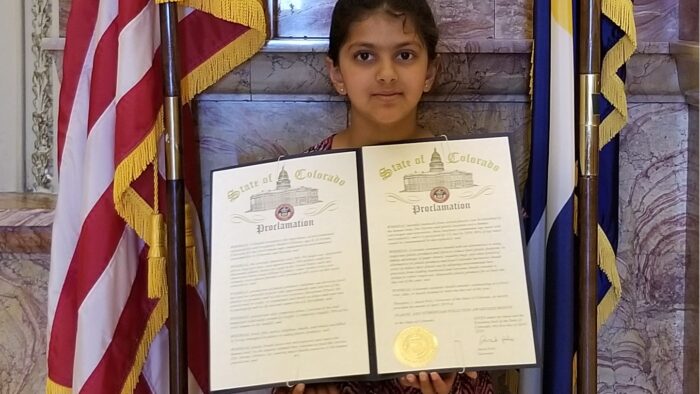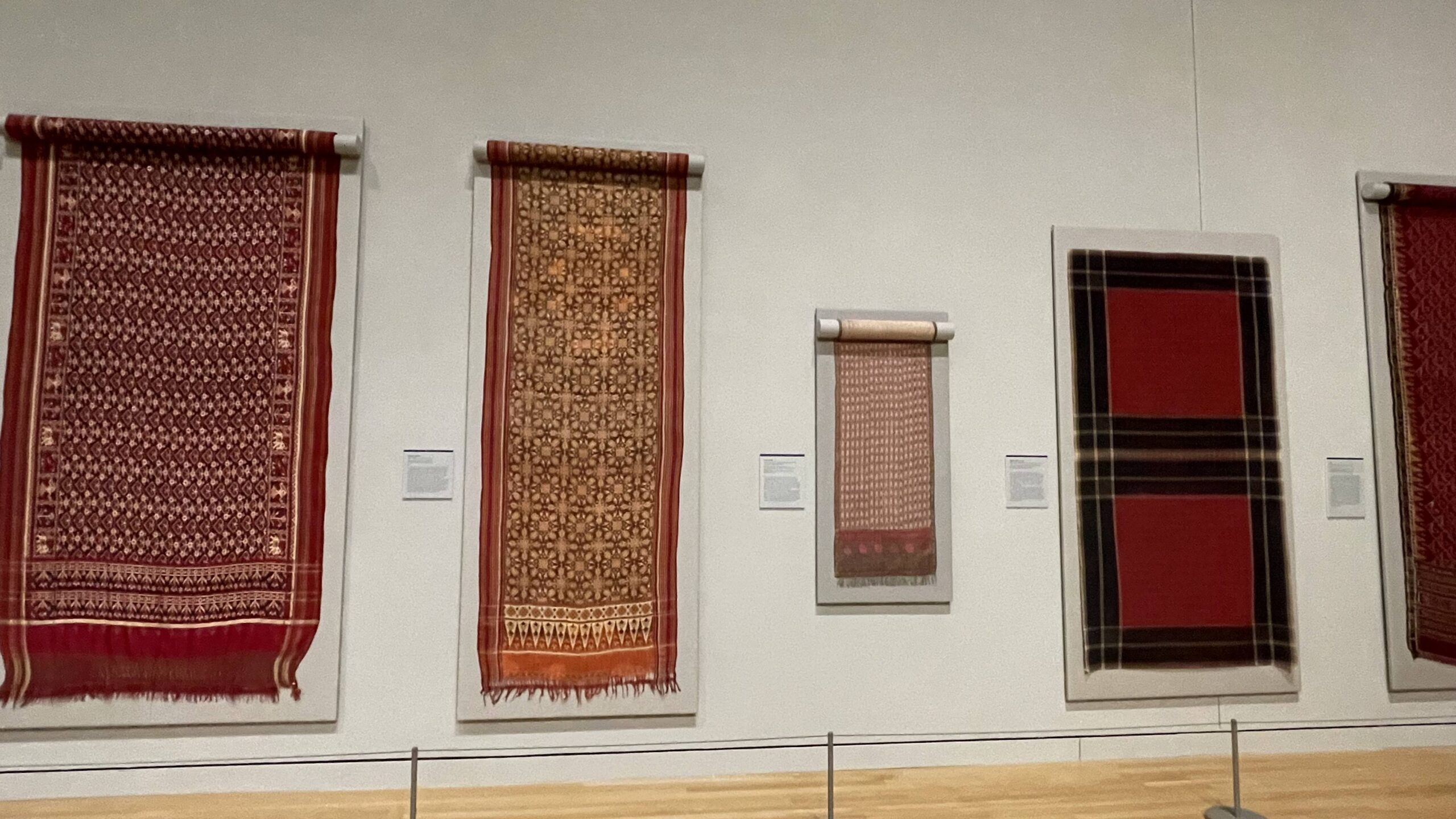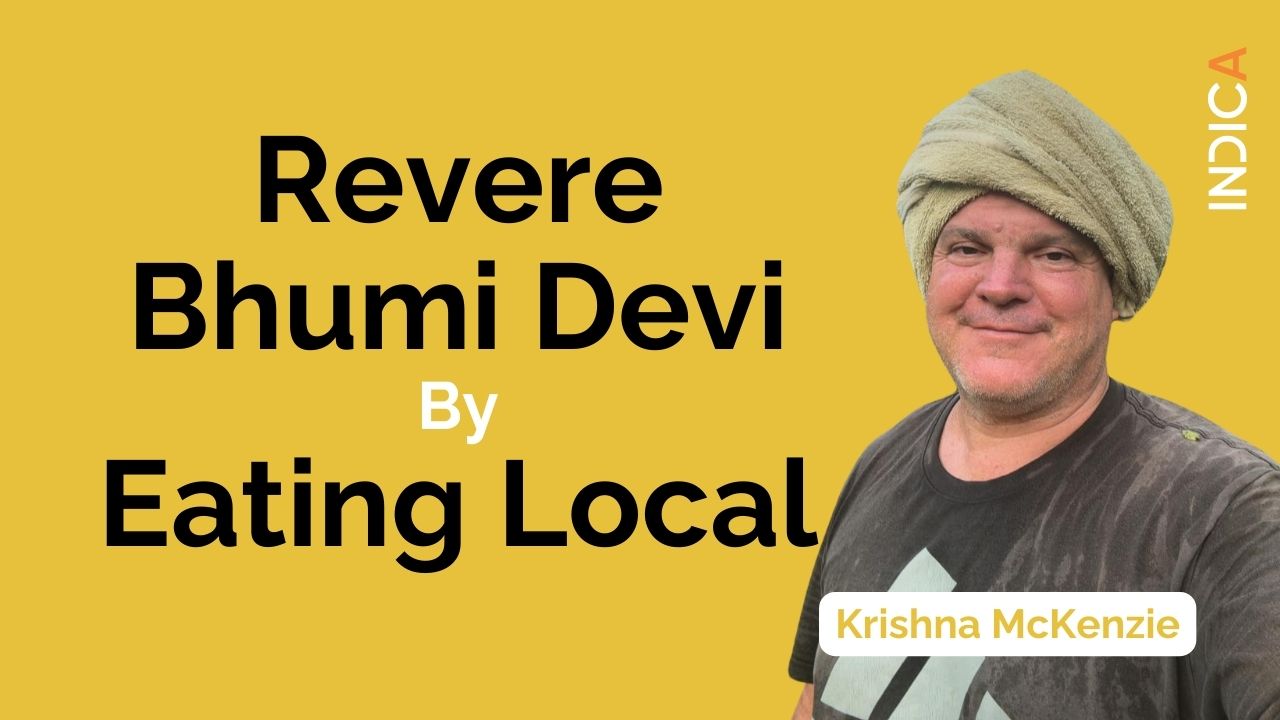Ten year old Madhvi Chitoor founded Madhvi4EcoEthics in 2017, in the United States to raise awareness against Plastic Pollution. The young activist, fondly known as NoStyrofoamNinja, has worked to protect ecosystems, public health and climate through advocacy.
Her first initiative was a signature drive to garner support to replace Styrofoam containers in school cafeterias. Her persistent campaign led to the end of 7.5 million Styrofoam containers being diverted from landfill annually and replaced with sustainable containers. Three Plastic Pollution Bills were introduced in the January, 2020. She has been part of many other initiatives since.
She hopes her actions will have some resonance at the COP 26 UN Climate Change Conference, hosted by the UK in partnership with Italy, which will take place from 31 October to 12 November 2021 in the Scottish Event Campus (SEC) in Glasgow, UK.
In this interview with CSP she talks about her inspiration and plans for the future.
Who is your inspiration in the world of Indian culture? Are there stories you have been inspired by?
Swami Vivekananda is my greatest inspiration in the world of Indian culture. My mom introduced me to him when I was 5 years old for my school competition in first grade. I narrated his speech “How to Build Character”. Please click the video link below, to hear my speech. https://youtu.be/_xw69ZlGu2Q
My mom and I have read together the Mahabharata by Shri. Rajaji, the first Governor General of India. Those stories also inspire me. My parents have bought a whole set of Amar Chitra Katha and I read them whenever I am free. Those stories inspire me a lot.
Also I learn Carnatic music and I recently watched a play on the Trinity of Carnatic Music. Also, I learn Indian Classical dance Bharatanatyam. My Mom has also taught me daily Sanskrit prayers and blessings like “Vasudhaiva Kutumbakam” and “Sarve Janaah Sukhino Bhavanthu” , “Aum Shantih Shantih Shantihi”, “Sahanavavathu” etc…that inspire me a lot.
How do you convert ideas into action?
I don’t know. I just do it.
How did you manage to write a book at an age children may not have fully read their first book?
There was a Jefferson county-wide all schools writing competition. I just tried and wrote my first book, “Is Plastic My Food?” for that competition with illustrations too. I ended up getting second place in the competition but it caught the attention of National Geographic and I got recognition from them too. Further, the US Congress too recognized me for my book. It is available at Amazon.com, apple Ibooks, and also in the public libraries in the US for public to borrow.

What is the damage that Styrofoam causes to the environment. How have your actions banned this modern day menace?
Styrofoam is plastic 6 and does not biodegrade and is not recyclable. Styrofoam is a burden to the landfill not because of weight but volume. They are broken down into leachates and microplastics due to sun, rain, snow etc. and they pollute our soil, ground water and drinking water. They enter our food by 2 ways - 1) through the fish or any aquatic animals that we eat which have ingested microplastics 2) via Styrene, a declared carcinogen that leaches when food comes in contact with Styrofoam containers.
First, I wrote an open letter to the then Superintendent of Jeffco Public Schools Dr. Jason Glass and did a signature campaign in 2018 to eliminate Styrofoam trays in all the school cafeterias in Jeffco Public Schools. The school district made the switch from styrofoam trays to compostable bagasse trays in all of Jeffco’s 155 schools, impacting 86000 students in Sep 2019 which eliminated 7.6 million Styrofoam containers from hitting the landfill annually. My second signature campaign and many Climate rally speeches lead to the bill HB21-1162 in the Colorado General Assembly which bans all styrofoam takeout containers and single use plastic bags in all restaurants in Colorado. It was signed into law by the Governor of Colorado on July 6th. I was invited for the bill signing ceremony too.
How have policy makers responded to your suggestions?
In 2018, at the age of 6, I met with US Congressman Mr. Ed Perlmutter and the then Governor now US Senator, Mr. John Hickenlooper to declare April as Plastic and Styrofoam Pollution Awareness month for the whole of Colorado. Then in April 2019 Gov Jared Polis also supported it. (Pic attached) That was really huge. Then, as explained above, the Jeffco Public Schools made the switch from Styrofoam lunch trays to bagasse trays in Sep 2019.
My first Climate rally speech on May 3rd 2019, led to the formation of the Zero-waste committee in the summer of 2019 (June/July) by the legislators. The Climate rally speeches on Sep 20 2019, Oct 11th 2019 , Nov 14 2019, all led to the 3 Plastic bills being introduced in the Colorado legislature in Jan 2020 which was then postponed due to COVID and then reintroduced into one consolidated bill HB21-1162 in Feb 2021 which was sponsored by State Representative Ms. Lisa Cutter, State Representative Mr. Alex Valdez and State Senator Ms. Julie Gonzalez and State Senator Mr. Leroy Garcia. Infact, it was my State Rep. Ms. Brianna Titone who introduced me to State Rep. Ms. Lisa Cutter and State Senator Ms. Tammy Story. It was signed into law by Governor Jared Polis on July 6th 2021. I was invited for the bill signing ceremony. He gave me the bill signing pen as a memento.

To convince the policy makers during voting of the bill, I had given several testimonies before several House and Senate Committees, made phone calls and wrote emails to more than 35 Mayors of cities all over Colorado, to the State Representatives in the Colorado House and to the State Senators in the Colorado Senate. The Voting time was always very tense. It was not easy. Many amendments were made to the bill. For eg. Even now the Styrofoam container ban law does not apply to Mom and pop stores.
On March 16th 2021 I met with Madam Kamala Harris and presented to her the Global Plastic Policy. She called me a “Future Leader” and said that she totally supports it and that her policy staff would follow up with me. They did follow up with me on April 20th 2021 and am working with them.
So overall, the responses from the lawmakers have been overall positive.
Why do you think elders have not thought of these solutions?
Elders are busy with leading their lives and earning money and do not care about societal problems. They are taking everything as “business-as-usual” and are burying their conscience and are doing activities and pursuing a lifestyle that is polluting our environment and destroying our ecosystems.
Now the Climate Change is a Climate Crisis and Climate Emergency and even elders now have to act and make personal lifestyle changes that will drive the huge Corporations to also change their actions.
You are musically inclined and accomplished. Do your music compositions address issues concerning the environment?
Yes, I am very musically inclined. I have been composing music since the age of 5. I can play many instruments like piano, violin, clarinet , recorder, trumpet, etc. I released my first album called “I am.. Princess Genius” when I was 8 yrs old in Sep 2019. The album is so titled due to the concatenation of the titles f two of my compositions Princess and Genius
Yes, One of my compositions titled “Harmony With Nature” resonates with my environmental advocacy. It is a Sonata with three movements. The first movement emotes Nature, the second emotes human actions. The third movement is both being in harmony. https://youtu.be/ZjJX557hLkk
India has a rich biodiversity and David Attenborough has given the voice for Wild Karnataka. What interests you about biodiversity?
I love India a lot. I have travelled to many places in India from Himalayas, Kashmir to Kerala to Rameshwaram to Kanyakumari to Mumbai to Chennai. Visited Adi Shankara’s cave and Adi Shankara temple in Kashmir and Adi Shankara’s birth place at Kaladi in Kerala.
India has a rich biodiversity. I have watched the documentary “Wild Karnataka” too. Very beautiful. I like biodiversity because it is nature at its best adapting to the regional weather and climate patterns. Hence accordingly we have region-specific native trees, plants and thereby animals and even crops that are grown suited for those conditions. I have read that India had at the time of its Independence in 1947 had around 300,000 varieties of rice itself. How wonderful? But now many are lost. These must be preserved. Biodiversity directly influences the cultures and traditions of that place too. Also, when biodiversity is preserved we tend to eat food suited for that place and so it even influences our health. That is why when we eat local food we humans would be healthy. Nature thrives when biodiversity is preserved.
How do you think the school education system can nurture and inculcate values about caring for the environment?
I really want the Government Department of Education in India and in all countries of the world to have a syllabus geared for Environmental Education right from Kindergarten to 12th grade with even having field trips and social projects teaching and implementing lifestyle changes to protect the environment.
I am pushing for that in the United States. This is very important because children are future leaders and they spend lots of time in schools and so the schools can easily bring about the lifestyle changes needed to protect our environment.
You recently conducted a conference. What were the main highlights?
Yes. I am really thrilled that I had organized the First International EcoEthics Summit in April 2021. In this sumit, we primarily focussed on Plastic Pollution and Climate Crisis. Students and organizations from 5 countries - US, India, Bangladesh, Mozambique and Gambia gave presentations about the projects they are implementing to reduce plastic pollution in their countries.
Also, I had Panelists guests from different walks of life - Scientists, educationists, government policy makers, diplomats and artists from US, Norway , India and Africa answering questions from participants from their perspective. That was unique and special to my summit.





